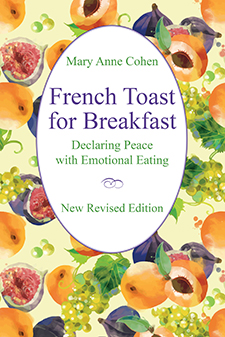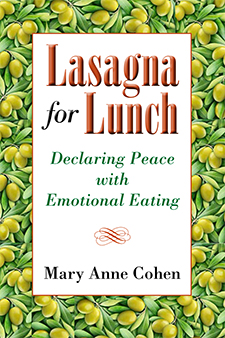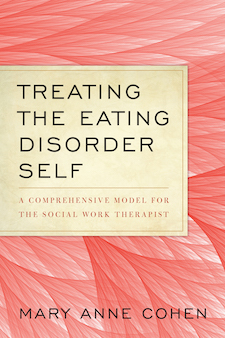The Power of Hope in Eating Disorder Recovery
The most important word in the English language is hope. – Eleanor Roosevelt
Are you hungry for hope? If you have battled your weight for a very long time, you may feel discouraged at ever sustaining positive changes. If you cannot stop throwing up after you binge, you may worry you will never get better. And if you look at yourself in the mirror and are convinced you could never like your body, you probably feel despondent. So, how do we inject hope into what feels like a hopeless situation? How do we move from hopeless to hope, to healing, to wholeness?
Hope is when you look forward to something you want and have reasonable confidence that you can reach your cherished goal. While optimism is a merely a positive attitude, hope has a goal and a determined plan of action to help you achieve your goal. It is not just a wish. It is a practical pathway for improving your future.
When people feel hopeless about making progress with their eating or weight issues, they do one of two things:
1. They become paralyzed and stuck in their misery and do nothing. Since nothing changes, their despondency deepens. Eating and weight issues become a chronic way of life with an increase in emotional and physical limitations. A lack of hope engenders passivity, becomes a self-fulfilling prophecy. Resignation then sets in.
2. Or they make a sweeping overhaul to change themselves dramatically and quickly. They begin to follow restrictive or fad diets and punishing exercise regimes. But a quick fix is rarely sustainable because it takes so much energy and deprivation. So people wind up eventually reverting back to their old behaviors.
Neither option provides much hope for long lasting change. So how can we stimulate hope when all our best efforts have failed? Jackie taught me an unusual lesson in hope. In our first consultation after listening to Jackie’s story, I told her she definitely had a diagnosis of binge eating disorder. A slow, bright smile lit up her face. She seemed thrilled! I was so surprised at her happy reaction that I asked her why. "Because, up until now, I just thought I was crazy!" Jackie explained. "I have been so ashamed and guilty and felt so alone with my chaotic, sneaky eating. Now that I know I have a real diagnosis, you are giving me hope that there is something I can do about it. If there really is a rhyme and reason to what I do, then hopefully I can change it!" [1]
Creative Strategies for Hope
Lauren, a new patient, taught me something original about hope. A bulimic married woman, Lauren was struggling to put even one day together without bingeing and purging. She came to her session and announced, “I did it! I didn’t binge last week at all!” “That’s great!” I responded enthusiastically. “What helped?”
“Every time I wanted to binge, I took a shower instead. I wound up taking seven showers every day!”
I was surprised at Lauren’s “solution” and worried that she was becoming obsessive compulsive about a brand new behavior! But she explained, “I know that sounds crazy, but it gave me hope that if I can find alternatives to detour my cravings, then maybe I have a chance to get better.”
Lauren proves that hope can be found anywhere – even in the most unconventional ways. Author Anne Lamott wrote, “Hope begins in the dark, the stubborn hope that if you just show up and try to do the right thing, the dawn will come. You wait and watch and work: You don’t give up.”
Lauren’s story reminded me of Debbie and her unique solution to improve her binge eating. Debbie would spend many evenings after work bingeing on cake and cookies. As we strategized alternatives, Debbie came to her next session and announced, “I found a new plan that seems to be working. Rather than binging on chocolate chip cookies this week, I started eating four heads of iceberg lettuce with mustard every night!” I was also startled at Debbie’s “solution” and hoped she wasn’t developing a brand new compulsive behavior around food. But she then explained, “I know I can’t spend the rest of my life gorging on lettuce, but if I can break the cookie habit, I’ll feel hopeful that I can keep doing better.”
Both Lauren and Debbie recognize that creating hope means taking any step away from one’s entrenched destructive habits. Even a small change in behavior can engender the belief that things can get better. Taking showers and bingeing on lettuce provides a step away from hurting yourself with food and teaches you that there are alternatives to make your goals more of a reality.
Both women realized that just wishing for a different outcome with their eating disorder struggles does not change anything. Instead, taking action – any forward action – is the key ingredient to growth and change.
In the field of addiction, the concept of “harm reduction” clarifies that people may not achieve abstinence from alcohol, drugs, gambling, cigarettes or eating disorders overnight. But there is value in reducing one’s negative behavior and committing to doing better even if the problem is still not yet solved. The fundamental strategy is to set an intention that is doable. Renee pledged to throw up only once a day as opposed to multiple times. She recognized this was only an intermediate step. But by committing to some boundaries and limits, she instilled hope in herself for a future time when she would free herself from bulimia.
H.O.P.E. = Hold On, Pain Ends.
The philosopher Thich Nhat Hanh counsels, “Hope is important, because it can make the present moment less difficult to bear. If we believe that tomorrow will be better, we can bear a hardship today.”
Recovering from an eating disorder is a gradual, step by step process. Realizing that your goal is progress, not perfection will help you appreciate the steps you have made. No step is too small to acknowledge.
Creating hope is about implementing problem-solving strategies that lead to a plan of action – a plan that is flexible, not restrictive. It is important to have the perspective that some days are better, some are worse; that’s true for all of us. Keep setting a daily intention and keep seeking a path to a better future with self-compassion.
To generate hope with your eating struggles, begin by doing just ONE thing different. Since change is composed of a series of forward moving steps, taking even one step in your own behalf will provide a glimmering of hope. Hope begets hope, and you can continue to build strategies against your emotional eating with "bite-size pieces."
The Power of One by Dr. Tamara Richardson recommends that we set ONE goal at a time, resist ONE more binge episode, make ONE more healthy choice, find ONE thing we are grateful for today about our body. [2]
Other strategies to encourage your own hope include:
Lessening your perfectionism. The identity of many emotional eaters is based on performance, pleasing, and striving to be perfect; they are convinced this is what makes them lovable. However, evaluating your life and your eating behavior through the lens of “I must be perfect” will sign you up for a lifetime of frustration and self-doubt. The antidote to perfectionism is believing that “good enough is good enough.” Erin is in recovery from anorexia and occasionally still lamented she was no longer a size zero. In her latest session, Erin stopped her self-criticism midstream and added, “OK, I realize after having three children, I have to learn to be more realistic. I’m allowed to be a larger size with a tummy to show for all my hard work of carrying my kids. Since my perfectionism could lead me straight back to anorexia, I need to remember it was my learning healthy eating that allowed me to get pregnant in the first place.”
Talking to yourself and being your own guidance counselor. Tony groans, “Today was a horrible day with my boss. I really wanted to binge and throw up to make myself feel better. But I’ve learned to just distract myself until that mood passes and have a healthy carrot juice instead. I’ll feel a heck of a lot better tomorrow for not giving in. My biggest realization in my recovery,” adds Tony, "is that my frantic moods will pass whether or not I binge and purge.”
Complaining, crying, even howling, and not bottling up hurtful feelings can be a satisfying way of expressing oneself that does not involve detouring emotions through eating behaviors. By developing a variety of techniques of self-expression, emotional eating does not have to be the only game in town. The comedian Lily Tomlin once declared, “God gave humans the gift of language, so we could complain!” And sometimes using your mouth for “purging” frustration in words and not using it for overeating brings satisfaction from tension and relief. Caroline, an anorexic and bulimic patient who was taught all her life to "suck it up," enjoyed my encouraging to complain loudly and often. She enjoyed this new found freedom so much that she presented me a coffee mug with this scene painted on it: A customer goes to the Complaint Department of a store and is asked by the clerk what his grievance is. The customer replies, "Pretty much everything!"
Speaking with others who have the ability to just listen (and not necessarily give advice). Venting stress rather than acting out with food is a robust tool to lighten one’s burden. “I love coming to therapy,” laughed Sherry, “because you have to totally listen to me and I don’t have to reciprocate by being polite and asking how you’re doing! Frankly, I don’t care how you are. I just want to talk about myself!”
Tolerating feelings. Although they can be very intense, feelings are not facts. Thoughts are not facts. Sometimes, in the heat of the moment, we distort how bad things really are. Bad feelings will pass whether or not we binge, starve, or throw up. Tolerating, expressing, and digesting challenging feelings, rather than acting destructively, builds “resilience muscles” for the next time a wave of strong emotions threatens to overtake us and lead us down the path of emotional eating.
Changing what you can, accepting what you can’t. Accept a certain amount of powerlessness. Take all necessary steps to fix a problem, and let go of the results. In the midst of a grueling divorce, Paula recognized that all the cake in the world was not going to resolve her conflict. She continued her plan of action to solve her legal dilemma while working valiantly not to compound her own pain by overeating.
Meditate on your breathing. Visualize what you need, ask the universe for peace of mind, and give gratitude for what you do have.
Practice self-care. Self-care rituals provide balance and inner harmony: enjoyable exercise, nutritious abundant food, deep sleep, relaxation, and times of peace and quiet to recharge your batteries.
Find perspective. Dr. Tian Dayton writes, “Resilient people tend not to let adversity define them. They see their problems as temporary rather than a permanent state of affairs and tend not to globalize. They find reasons and ways—whether religious, creative, or good common sense—to place a temporary framework and perspective around the problems in their lives.” [3]
Everyone’s path to self-care and self-soothing is as unique as a fingerprint. Keep refining your unique path. The last chapter has not yet been written on your life. There is still room and time to cultivate a good, strong relationship with yourself where food is no longer a tool for emotional expression and release. And,
“Just remember, in the winter
Far beneath the bitter snow
Lies the seed that with the sun’s love
In the spring, becomes the rose.”[4]
Published in RecoveryWarriors.com
Footnotes
[1] Names and identifying data have been changed for confidentiality.
[2] Adapted from Tamara Richardson, Ph.D., “The Power of One,” www.eatingdisordersrecoverytoday.com/print/nl_edt_15print.html.
[3] Tian Dayton. Emotional Sobriety (Health Communications, 2008). pg. 101.
[4] “The Rose,” sung by Bette Midler



